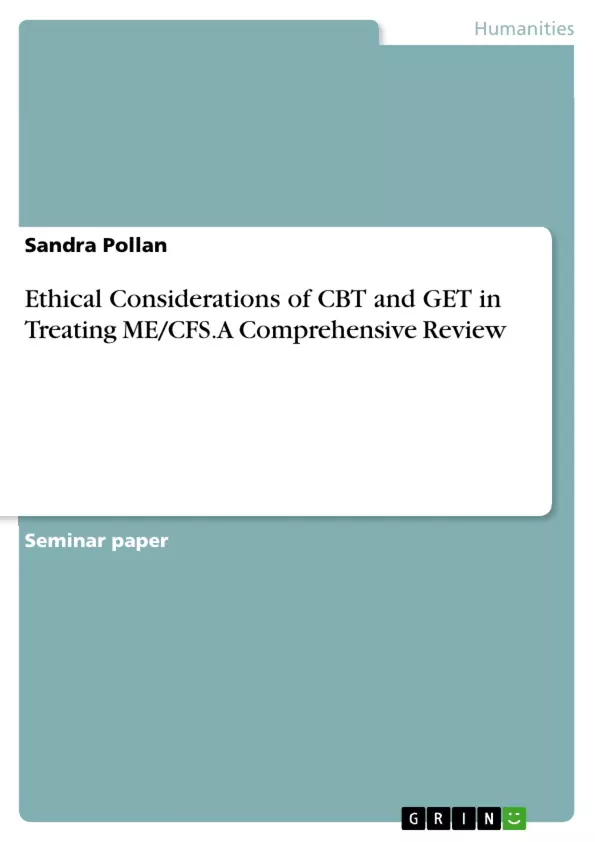Myalgic encephalomyelitis (ME) / Chronic fatigue syndrome (CFS) is a debilitating neurological condition marked by severe fatigue, immune dysfunction, and autonomic nervous system disorders. Despite the complexity and severity of ME/CFS, treatment options remain limited, with Cognitive Behavioral Therapy (CBT) and Graded Exercise Therapy (GET) commonly prescribed. This review critically examines the ethical implications of standardizing CBT and GET as treatments for ME/CFS. Highlighting the diverse patient responses and potential harm, the review argues for a more individualized approach to therapy. It underscores the urgent need for extensive research into ME/CFS and advocates for comprehensive support from the healthcare system to better address this challenging condition.
Inhaltsverzeichnis (Table of Contents)
- Abstract
- Background
- Myalgic encephalomyelitis (ME) / chronic fatigue syndrome (CFS)
- Prevalence
- Etiology
- Diagnostics
- State of Research
- Treatments
- Health Promotion
- Cognitive Behavioral Therapy (CBT)
- Graded Exercise Therapy (GET)
- Discussion
- Ethical Principles in Health Promotion
- Current Treatment Recommendation
- Treatment with CBT
- Combined Standardized Treatment with CBT and GET
- Positive Impact of CBT/GET Therapy
- Negative Impact of CBT/GET Therapy
- Elimination of Ethical Problems
- Conclusion
- References
Zielsetzung und Themenschwerpunkte (Objectives and Key Themes)
This review focuses on the ethical aspects of standardized treatment with Cognitive Behavioral Therapy (CBT) and Graded Exercise Therapy (GET) for patients with Myalgic Encephalomyelitis (ME) / Chronic Fatigue Syndrome (CFS). The review aims to analyze the potential ethical implications of these treatment approaches and evaluate whether they are appropriate for all individuals with ME/CFS.
- Ethical considerations in health promotion for ME/CFS
- Analysis of the current treatment recommendations for ME/CFS
- Evaluation of the effectiveness and ethical implications of CBT and GET
- Exploration of the potential benefits and drawbacks of combined CBT and GET treatment
- Discussion of the need for further research and tailored treatment approaches for ME/CFS
Zusammenfassung der Kapitel (Chapter Summaries)
- Abstract: Provides a brief overview of the topic, highlighting the lack of specialized therapies for ME/CFS and the focus on the ethics of standardized CBT and GET treatment.
- Background: Introduces the definition of ME/CFS, its prevalence, etiology, diagnostics, and current state of research. It discusses the challenges associated with understanding and treating this complex condition.
- Treatments: Reviews various treatment options available for ME/CFS, including health promotion, CBT, and GET, emphasizing their role in managing symptoms.
- Discussion: Explores the ethical principles guiding health promotion in the context of ME/CFS, analyzing the current treatment recommendations and the ethical considerations surrounding CBT and GET therapy. It examines the potential benefits and drawbacks of these approaches, including the possibility of exacerbating symptoms.
Schlüsselwörter (Keywords)
The main keywords and focus topics of this review include Myalgic Encephalomyelitis (ME), Chronic Fatigue Syndrome (CFS), Cognitive Behavioral Therapy (CBT), Graded Exercise Therapy (GET), ethical considerations, health promotion, standardized treatment, and patient-centered care.
- Quote paper
- Sandra Pollan (Author), 2022, Ethical Considerations of CBT and GET in Treating ME/CFS. A Comprehensive Review, Munich, GRIN Verlag, https://www.hausarbeiten.de/document/1490463


